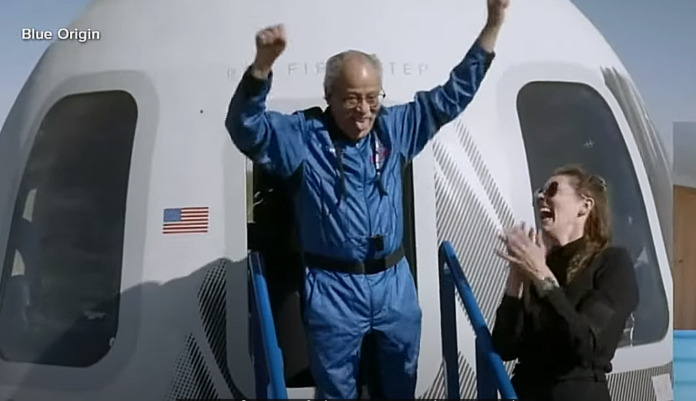Ed Dwight, a 90-year-old artist and former Air Force test pilot who was denied a chance to become the first African American astronaut six decades ago, finally rocketed into space on Sunday, fulfilling a cherished dream in a brief up-and-down flight out of the lower atmosphere.
"Absolutely fantastic!" he exclaimed after touchdown. "A life-changing experience. Everybody needs to do this!"
Strapped into a Blue Origin New Shepard capsule, Dwight and five crewmates -- a retired accountant, an Indian pilot and adventurer, a software engineer, a French entrepreneur, and a venture capitalist -- blasted off from company owner Jeff Bezos' West Texas launch site just after 10:35 a.m. EDT, climbing away into a cloudless sky.
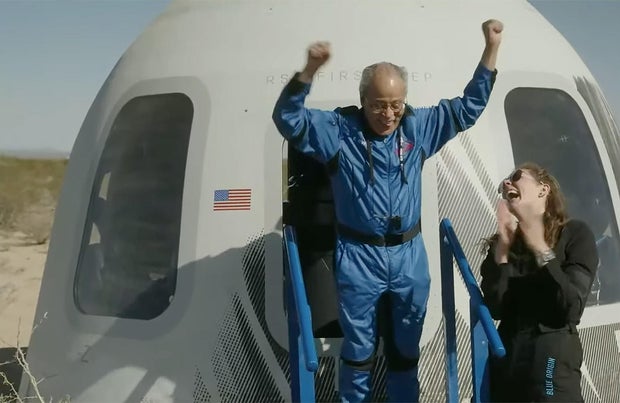
It was the company's first New Shepard flight with passengers aboard since a booster failure two years ago derailed an unpiloted research flight. A successful repeat mission late last year, also without a crew on board, cleared the way for the resumption of passenger flights.
"There was a part of my career that wasn't quite fulfilled, and here's a grand opportunity at this late date to fulfill that for self-satisfaction, yes," Dwight said in a pre-launch interview with CBS News.
"But more importantly, to satisfy all the wonderful people who have showered me with love for all these years. Because it is those people who wanted me to go into space in the worst kind of way. To them (this) is justice."
During the 10-minute sub-orbital flight on Sunday, the New Shepard's single-stage hydrogen-fueled rocket accelerated the crew capsule to more than 2,100 mph at an altitude of 185,000 feet before releasing it to continue coasting upward.
Weightless at that point, the crew reached an altitude of about 65 miles, a few miles above the internationally recognized "boundary" between the discernible atmosphere and space.
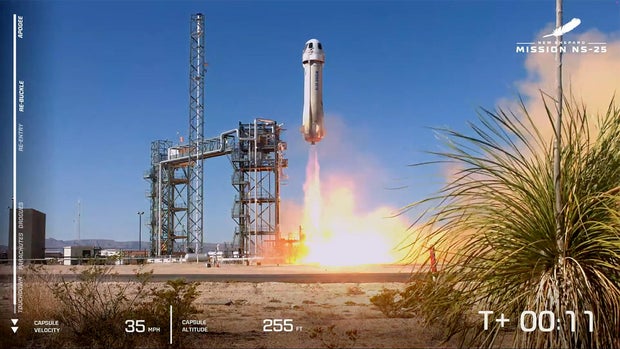
Between booster cutoff and the capsule's re-entry, the six crew members were able to unstrap and enjoy about three minutes of weightlessness, taking in spectacular views of the Earth below as the spacecraft arced over the top of its trajectory for descent to a parachute-assisted touchdown a few thousand yards from the launch pad.
"I didn't think I needed this in my life," Dwight said after climbing out of the capsule. "I lied!"
One of the spacecraft's three main parachutes failed to inflate fully, but the spacecraft is designed to land with just two chutes safely, and the crew, all smiles after touchdown, obviously had no problems.
At 90 years and eight months old, Dwight is the oldest person ever to fly in space, edging out actor William Shatner, who launched aboard a New Shepard at age 90 in 2021, by a few months. Aviatrix Wally Funk, who joined Bezos for the company's first piloted flight, ranks third on the list of "most senior" astronauts, flying at age 82.
A ticket to ride on a New Shepard is believed to cost around $500,000. Dwight's seat was sponsored by the non-profit Space for Humanity with support from the Jaison and Jamie Robinson Foundation. Jaison Robinson flew aboard a New Shepard in 2022.
Dwight's crewmates -- venture capitalist Mason Angel, French entrepreneur Sylvain Chiron, software engineer Kenneth Hess, retired accountant and adventurer Carol Schaller, and Gopi Thotakura, a commercial airline pilot and the second Indian national to fly in space -- are believed to have paid for their seats, but the actual costs are not known.
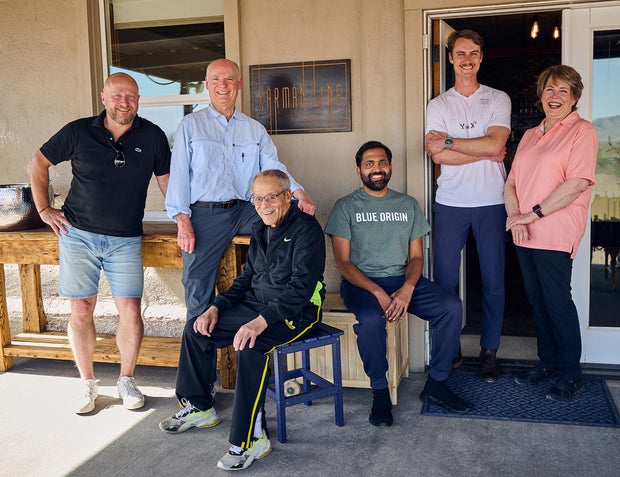
Before launch, Dwight told CBS News he looked forward to seeing "the beautiful little round ball we call the Earth that we're not doing a very good job of taking care of, by the way. But it allows you to have a different perspective."
"I have this theory that I think every politician that runs for public office in the United States of America needs to do at least three orbits around the Earth so they can see what this place is all about," he said. "And they would stop destroying it. That's my wish. That would be a requirement for everybody that ran for political office on a national level."
As NASA's Mercury program was ramping up in the early 1960s, President John F. Kennedy let it be known that he wanted an African American in the space agency's astronaut corps. Dwight got the nod and trained at the Aerospace Research Pilot School at Edwards Air Force Base, passing through the initial round of training.
But NASA did not select him as an astronaut, and he resigned from the Air Force in 1966 with the rank of captain. After stints in the private sector, Dwight earned a master of fine arts degree in sculpture, focusing on black history pioneers. He owns and operates Ed Dwight Studios in Denver.
"I've had, you know, 60 years to sit on and think about all the parts and pieces of this," he told CBS News correspondent Jericka Duncan. "But the reason I have even the slightest bit of interest in going into space right now is that I've had a group of fans that have followed me from 1964, several generations, the fan mail has never stopped.
"The more I thought about it, what better way to fulfil my fans for the things that they've been asking me about for the last 60 years? And the opportunity came to fly into space."
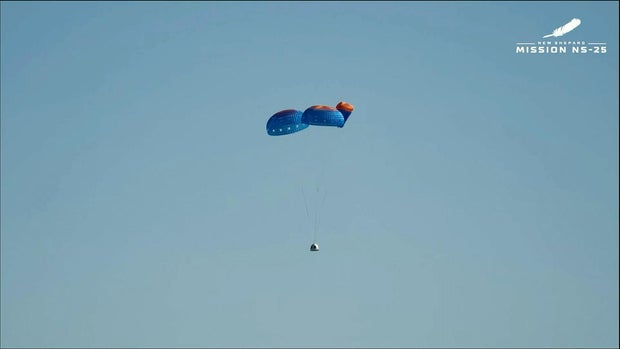
He said African American astronaut Leland Melvin first broached the idea while the two were working on "The Space Race," a documentary about the history of Black astronauts and engineers in NASA's space program.
"This all happened in a relatively short period of time," Dwight said. "We had been working on 'Space Race,' and we had been travelling around the country doing film festivals. We were involved in Q & A's (and) how would you like to go up?" Melvin had contacts at Blue Origin, he added, "so it just evolved."
Blue Origin was on a launch-per-month pace in September 2022 when an uncrewed New Shepard carrying 36 experiments suffered a booster failure one minute after liftoff, triggering an automatic abort. The capsule was propelled away from the booster and landed normally a few minutes later.
The abort was blamed on the failure of the nozzle of the BE-3 engine powering the New Shepard rocket. After an extensive investigation, Blue Origin modified the rocket to prevent any similar malfunctions and successfully launched another unpiloted research flight in December 2023, clearing the way for the resumption of passenger flights.
Blue Origin's New Shepard is competing against Richard Branson's Virgin Galactic to carry space tourists, professional astronauts and others on sub-orbital space flights. Virgin Galactic has launched 55 passengers on 11 flights of the company's Unity spaceplane so far while Blue Origin has now launched 38 men and women on seven flights.
While Virgin is focused solely on sub-orbital flights, Blue Origin also is building a moon lander and a partially reusable orbital-class rocket -- the New Glenn -- to compete against SpaceX's workhorse Falcon 9 and Falcon Heavy boosters.
Latest Stories
-
VRA cautions against farming, building within 280ft Volta Lake contour
11 minutes -
Ghana, China sign MoU to build NEV Assembly Plant
17 minutes -
Ghana Chamber of Mines engages journalists in Takoradi
21 minutes -
Ghana accelerates efforts to boost Intra-African Trade
1 hour -
Attorney General Ayine won’t trade law for pressure – Deputy AG defends integrity of prosecutions
2 hours -
Attorney General Ayine won’t prosecute without evidence – Deputy AG Srem Sai assures
2 hours -
Mahama to build Trauma and Emergency Centre in Walewale, leaves Bawumia-started project in limbo
3 hours -
Withdraw Dumsor Levy now, postponement isn’t enough – Minority Leader
3 hours -
Trump directs ICE to expand deportations in Democratic-run cities, undeterred by protests
3 hours -
MI6 appoints first female chief in 116-year history
4 hours -
Kenyan blogger’s wife seeks answers after his death in police custody
4 hours -
Gunmen kill at least 100 people in Nigeria’s Benue state, Amnesty International says
4 hours -
Ivory Coast workers say Unilever is violating their union rights amid share sale, documents show
4 hours -
Trump floats plan for undocumented farm and hotel workers to work legally in the U.S.
4 hours -
South Africa stocks suffer $3.7bn losing streak from foreign investors
5 hours

